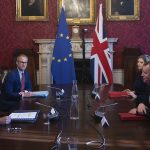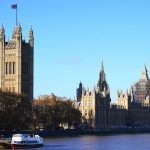The prime minister leaves Washington with some progress on two of his goals on this trip: to get his foot in the door on the global response to the risks of artificial intelligence, and deepen economic ties with our biggest trading partner.
The announcement of the first global AI summit to discuss how the world might multilaterally mitigate risk in London is a win.
Mr Sunak wanted to use this visit to directly impress upon President Joe Biden that the UK has the knowhow to take a bigger lead in the regulation of AI, and this summit is a start in the bigger push to locate any global watchdog in London.
And from the language used by Mr Biden at the news conference, it looks like Mr Sunak succeeded.
The US president told his audience in the East Room of the White House: “We’re looking to Great Britain to help me in that effort to figure out a way through [the handling of AI].
“So we’re in full cooperation. Because there’s no one country we have greater faith in being able to negotiate this. We’re in lockstep.”
For a country that has been shut out of negotiations between the EU and US on regulatory frameworks, this would have been very welcome language.
Please use Chrome browser for a more accessible video player
Mr Sunak prides himself on his knowledge of AI and thinks it’s an area where he can stake ground for the UK.
He likes to share an essay with AI novices called Why AI Will Save The World by Marc Andreessen, which presents a bullish case of how artificial intelligence can enhance our lives.
But, as Mr Sunak told me in our interview this week, he is also very cognisant of the existential threat to humanity it poses if left unchecked, and needs grasping quickly given that AI is evolving faster than expected.
And this goes beyond just the PM’s personal interests – from a UK perspective, in a post-Brexit world where London no longer acts as the natural transatlantic bridge between Washington and Brussels, Mr Sunak is trying to stake a claim to leadership elsewhere.
The UK’s leadership on Ukraine, kickstarted by Boris Johnson and continued by Mr Sunak, has been noted, both on Capitol Hill and in the White House.
While Washington has size and scale, London, say UK officials, can demonstrate first-mover advantage, unencumbered by the EU.
What Mr Sunak wants to show is that the UK can be a nimble operator – and from his remarks at the news conference, President Biden looks like he could have bought in.
Please use Chrome browser for a more accessible video player
For there’s no doubt, after that scratchy period during the Johnson years and Truss days, that relations were strained.
Mr Sunak has remedied that: in the Oval Office on Thursday, the two leaders spent 40 minutes in a one-on-one meeting, and another 30 minutes in a more formal bilateral with advisers.
No 10 insiders tell me they were pleasantly surprised by Mr Biden’s warm language following those discussions in the news conference.
There is a feeling on the plane back to London that Mr Sunak landed his pitch to be a leader in AI regulation with the US.
Time will tell whether the UK’s hosting of a global conference on mitigating AI risks in the autumn will evolve into the UK hosting the first AI global regulator, something the PM is pushing for.
Be the first to get Breaking News
Install the Sky News app for free
From a No 10 perspective, this is an administration that is getting wins on the international stage, be it the Windsor Framework with Brussels or the Hiroshima accord with Japan.
And from a prime ministerial perspective, the foreign policy progress Mr Sunak’s making is perhaps the most successful aspect of his first six months in No 10.
This is a leader who seems genuinely comfortable on the global stage and seems to build genuine rapport with allies from the EU’s Ursula von der Leyen to Mr Biden.
As for the deepening of economic ties between our two nations, the announcement of the Atlantic Declaration to strengthen the special relationship was a further sign that allies are trying to cut China out of supply chains amid fears of Beijing’s growing aggression.
But the hard reality is that the free trade deal hailed as a big Brexit win for the British people had failed to materialise after Mr Biden, perhaps constrained by congressional constraints, put that trade deal in the deep freeze.
Read more:
PM blames pandemic and war for failure to strike US trade deal
Sunak criticises Starmer over ‘bizarre’ North Sea oil and gas ban
Click to subscribe to the Sky News Daily wherever you get your podcasts
Mr Sunak has long said that he wants to focus on the quality rather than speed when it comes to trade deals (the US-UK deal will be looked at again in 2025), but the hard facts are that the Conservatives promised a free trade deal with the US by the end of 2022, and that deal has failed it materialise.
It is a broken promise.
When I asked the PM in Washington on Thursday to acknowledge this government had failed on this election pledge on Thursday, Mr Sunak said the “macroeconomic situation had evolved” and insisted that the UK-US economic partnership was still strong and reflected new threats.
“Since [that pledge] then we’ve had a pandemic. We’ve had a war in Ukraine and that has changed the macroeconomic situation,” he said.
“And the right response to that is to ensure that we’re focusing our engagement economically on the things that will make the most difference to the British people.
“The real challenge we face are the threats to our economic security. And actually what I’ll be talking to President Biden about today is how can the UK and the US work together to ensure that security for our citizens? I think that’s the thing that we should be focusing on right now.”
No trade deal, but for this PM, the special relationship looks in good shape.
Please use Chrome browser for a more accessible video player
An Atlantic Declaration that maps out future cooperation on issues such as artificial intelligence, key supply chains and defence manufacturing is a result.
On politics and policy, the special relationship between not just the US, but the UK on a wider global stage is looking in better shape than it’s been for a good few years.
It might not be a vote winner for Mr Sunak come the next general election, but he comes across as the prime minister who believes this is the right thing to do for Britain’s post Brexit relevance and prosperity.
He is a leader who is winning points on the world stage, but still desperately behind in the polls.






















